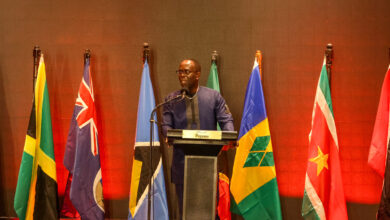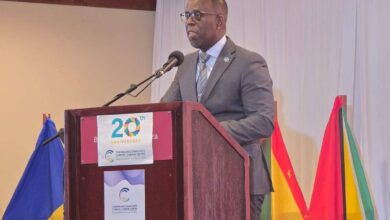RESHAPING OUR WORLD
At the Meeting of the Conference of Heads of Government in Georgetown, Guyana in July 1986, the then Prime Minister of Barbados, the Rt Hon Errol Barrow, asserted that it was the “collective wisdom” of the Caribbean people that would make for unity and integration within the Community. He was however, adamant that:
“the promise of the regional integration movement, even in the area of trade, cannot be realised unless we find new ways of communicating to our people the meaning and purpose of all our regional institutions”
When those words of admonition fell from the lips of Prime Minister Barrow the information age had not yet reached full bloom to become the signature of the era . The imperatives of the information age now beckon us to make full use of the processes that are present and available to give life and substance and strength to that visionary reminder.
In the lengthy march towards establishing our own final appellate tribunal here in the Caribbean, we have now arrived at a plateau. The signing of a framework Agreement to advance on a structured and measured basis now signals a settled intention on our part to have our constitutional arrangements and our constitutional discourse drive us to shape the kind of community that we wish to create for ourselves.
So that, CARICOM’s first definitive step on the journey through the 21st Century has not only evidenced the signing of a document, highly symbolic and determinative though that might be. It heralds, at long last, the process towards our self-definition being placed squarely on the table; confidence in the steel of our strength tempered by the fire of our struggles through the centuries being once more put to the test; closing the chapter on reliance on the Great Imperial Court of the British Empire now being firmly placed within our collective grasp.
And since the initiative is, in truth, being taken for the emotional, social and economic upliftment of our young people and those who will come after them, Prime Minister Barrow has told us that for them to feel themselves connected to the process in what is, in essence, a cultural search, they must be informed in a coherent manner of what the Institution of our own final appellate tribunal will stand for in that search.
We are obliged to speak to our young people directly; to the children of independence. For it has not escaped us that there is a real difference in the perspective of pre-independence as against post-independence Caribbean people. Pre-independence persons see the abolishing of appeals to the Judicial Committee of the Privy Council as a natural progression towards closing the circle of independence.
For the children of independence however, it is more a case of how they can be a part of, and be connected to, the new Institution that is proposed.
The signing of this Agreement, though a significant development, does not pre-empt the options of the signatories. As a matter of law, it does not and cannot be an irrevocable commitment to the conclusion of a process. Signatory States are required to ratify the Instrument in order to establish their consent to be bound thereby. Furthermore, even those who ratify have the option of entering a reservation to the appellate jurisdiction of the court. What this suggests is that the Court is indispensable for the successful operation of the CARICOM Single Market and Economy, and in respect of which all States have to be on board.
It is perhaps ironic that these Closing Remarks relate to a signing ceremony which marks the commencement of an historic process to complete the constitutional arrangements of the Member States of the Caribbean Community, initiated by the attainment of independence by Jamaica in 1962. So we move to re-shape our world as suggested by Professor Simeon McIntosh. He maintains that:
“Constitutional interpretation has a great symbolic importance; it is a public act of self definition. With our independence, we acquired the authority to define ourselves as a community. The hope is that with a Caribbean Court, we would be forced to re-construct our discourse, to re-shape our world, much in line with what our poets and novelists have already begun. The Caribbean Court must be the centre of our discursive advancement towards the development of our juris prudence. For the ground of the battle in constitutional adjudication is a fundamental conceptual debate about the way in which Caribbean life is to be constituted, lived and justified:”
For my own part, I consider myself profoundly privileged to be a part of this journey, for it is the means by which our civilization might ultimately come to be judged.
We take this opportunity to pay public tribute to the legal unit at the CARICOM Secretariat, the various parliamentary counsel and Registrars of Member States, the legal fraternity and members of Civil Society who have assisted immensely in the preparation of the Agreement just signed and the several draft supporting Instruments, and for their commitment to the process.
The Caribbean Court of Justice is meant to be one of the main pillars upon which the peoples of the Caribbean must build their process of growing up, of working and reaping together.
Let us, therefore, to the task.





